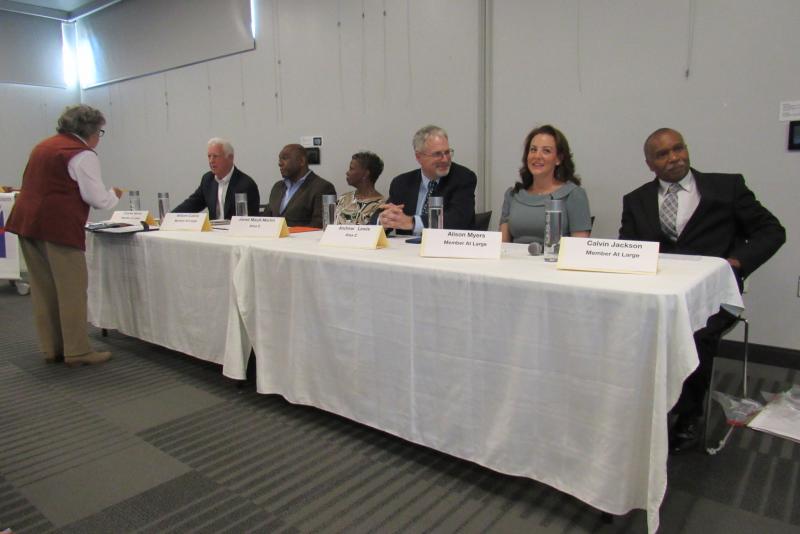Cape board candidates debate operating costs, safety, diversity
Six candidates for three seats on the Cape school board fielded questions on operating costs, safety, community involvement, diversity and discipline at a packed public forum in Lewes April 23.
Challengers Bill Collick, Calvin Jackson, Janet Maull-Martin and Chuck Mowll joined incumbents Andy Lewis and Alison Myers for the forum, sponsored by League of Women Voters of Sussex County.
Candidates said the district would need an operating expenses referendum to combat growth. Maull-Martin said some districts assess impact fees to developers. She said the district should include figures based on housing permits when planning and explore ways to foster investment from developers.
Mowll said he would make schools safer by identifying security gaps through a Homeland Security survey and implement suggested improvements. “There’s no school that’s immune from violence,” he said.
Candidates said students must feel safe and welcome, regardless of sexual orientation. Lewis said state representatives told him the district exceeds requirements on transgender protection policies.
Mowll said he developed LGBTQ standards for treating patients with respect when he worked for hospital accrediting board Joint Commission, and said similar guidance should be in place for students.
Jackson said policies and procedures are great, but teachers should be trained to deal with bullying. “I can’t imagine how any student can come to school and learn if they don’t feel safe,” he said.
To involve the community, Jackson and Collick pushed for mentoring programs, which Collick said could help close the achievement gap. Maull-Martin said board members should visit district communities.
“We need to take the time to go to Cool Spring, Pinetown, Cedar Creek, West Rehoboth, Long Neck,” she said, rising from her seat. “It’s not about the community serving the school board, it’s about the school board serving the community.”
Discussion resurfaced in response to a question about a pool at Cape High, first considered in the early 1970s when the original high school was constructed, and later defeated in a 2006 referendum that funded the new high school.
Myers said the district has other priorities. “I cannot ask my public to pay for a pool when I have students at Milton Elementary who are having classrooms in old locker rooms and shower rooms.”
Myers said when all facilities are up-to-date by 2024, a referendum for a pool might be appropriate. She said it would have to be supported by the community; the state will not fund a pool.
Maull-Martin and Collick said the budget was tight; both suggested partnerships or a private donor could help fund a pool. Mowll said the district has fields for other sports but no venue for swim teams; Jackson said other districts include swimming in the physical education curriculum.
Lewis said he opposes putting a pool on a referendum. He said the cost to build a pool would be half the local cost for building the new middle school and Cape High expansion, and operating costs would be $1 million a year.
“It would be the equivalent of me adding 50 more teachers,” he said. “That’s just too high for me to ask.”
On discipline, Maull-Martin said teachers should model desired behavior and enforce it through repetition and consistency.
Lewis, Myers and Jackson said restorative practices, which allow students to correct inappropriate behavior and staff to find root causes of student misbehavior, help students develop leadership skills and stay in class. Jackson said just one suspension doubles the chance a student will repeat a grade, and that keeping students in class reduces dropout rates and helps close the school-to-prison pipeline.
Mowll said his youngest son fell into the wrong crowd and was expelled as a sophomore.
“You know what saved him? The teachers,” he said, fighting tears. “They took him under their wing and got him going the right direction. We can’t give up on our kids.”
On diversity, Collick said students need to see people who look like them making decisions. He said as a boy, he played with all the town kids in a field that now houses Shipcarpenter Square in Lewes.
“I became friends with [retired Cape High teacher and coach] Rob Schroeder, and I learned at an early age that a peanut butter and jelly sandwich at his house tasted the same as at mine,” Collick said. “You miss the boat when you don’t have varied experiences. We’re never as far apart as we think.”
Myers said research shows students who see people who look like them do better in school. To increase staff diversity, she said the district changed a hiring requirement. In the past, dual certification in regular and special education was required; now it is preferred.
“Not every college or university offers dual certification,” she said. “ We were missing a big chunk of people who were qualified.”
Jackson said as part of the Minority Community Liaison Committee, he worked with Cape staff to develop a list of historically black colleges and universities to recruit from. Lewis said Cape is a global community now, and every child should have someone to look up to and respect.
Maull-Martin said it takes a village to raise a child, and school should reflect that village. When she was in first through seventh grade, Maull-Martin said, she attended a segregated school where she was encouraged daily.
In eighth grade, she said, she was the only African-American in her class. Maull-Martin said she remembered never being called on in algebra class, and crying outside the classroom because she was not accepted by the teacher and saw no one who looked like her.
“Kids need to be exposed to all cultures and races,” she said.
Mowll said statistics show disparities are real, and that the district needs to develop specific diversity goals and a project report.
Citing data from the Delaware Report Card, Mowll said 93 percent of Cape teachers and 66 percent of students are white, 4 percent of teachers and 13 percent of students are African-American, and 3 percent of teachers and 15 percent of students are Hispanic.
Video of the forum will be on the League of Women Voters YouTube channel until the May 14 election.
About the election
Incumbent Andy Lewis and Janet Maull-Martin are vying for the Area C seat. Calvin Jackson is challenging incumbent Alison Myers for an at-large seat; both are five-year terms.
Chuck Mowll and Bill Collick are running to fill the last year of board member Roni Posner’s at-large seat.
Area C candidates must live in the Lewes and Angola area; however, all residents 18 years and older living within the Cape Henlopen School District can vote in school board elections.
Residents do not have to register to vote. Voters must be U.S. citizens, 18 years of age or older and show proof of residence in the Cape Henlopen School District such as a driver's license, auto registration or utility bill with a person's name and address.
The Cape Henlopen school board election will be held 7 a.m. to 8 p.m., Tuesday, May 14, at Rehoboth Elementary, Mariner Middle and Cape High.






















































